Budapest's Ruin Pubs: History, Venues, and Visitor Tips
Walk through a random door in Budapest's Jewish Quarter and you'll find yourself in a completely different world. Ruin pubs (locals call them "romkocsma") are probably one of the coolest nightlife things in Europe. These places take old, falling-apart buildings and turn them into amazing bars and hangout spots. They don't try to hide the decay - they make it part of the experience. And trust us, it works.
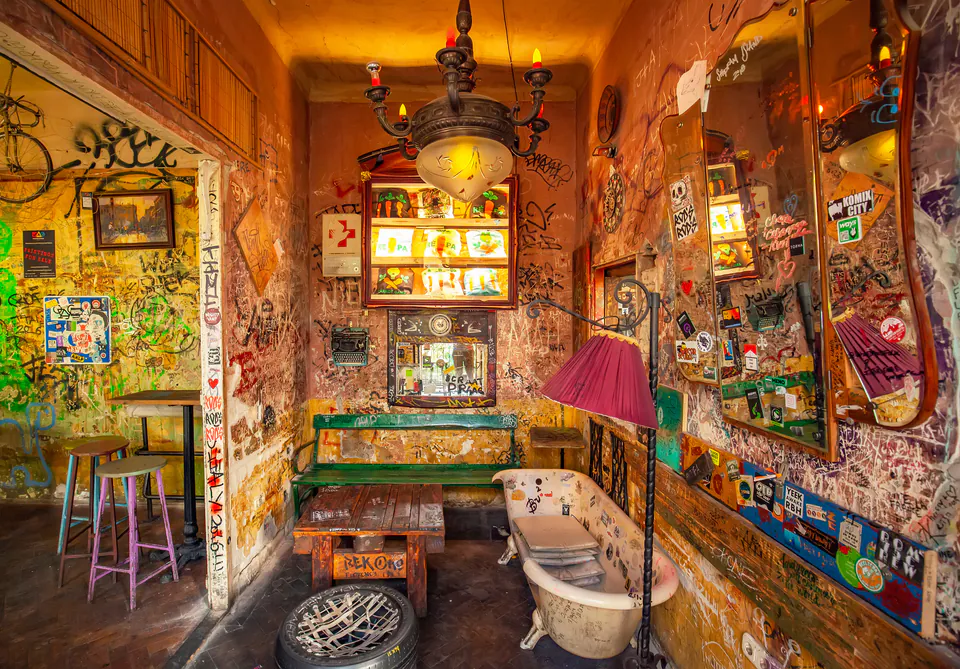
What's So Special About Ruin Pubs
These places started popping up in the early 2000s in Budapest's old Jewish Quarter. People took buildings that had been empty since World War II and the communist years and turned them into bars. But here's the thing - they didn't fix them up or make them pretty. They left all the crumbling walls and broken stuff and just worked around it.
We love how nothing matches in these places. You might sit in an old bathtub to drink your beer, or find yourself at a table made from a car door. The walls are covered in graffiti and street art, and everything looks like it came from different decades. It sounds messy, but somehow it all works together.
This isn't just some design trend. These bars actually tell the story of Budapest's tough history. Instead of tearing down damaged buildings, people turned them into places where the community could come together and have fun.
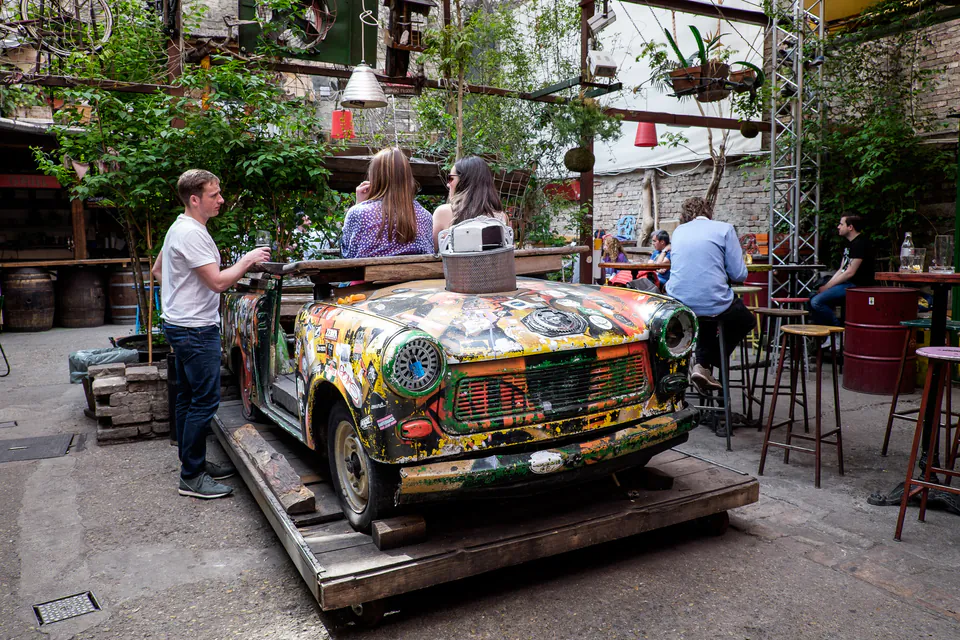
How It All Started
The first ruin pub opened on Kertész Street back in 2002. Then in 2004, Szimpla Kert opened in an old stove factory on Kazinczy Street. That's when things really took off. Ábel Zsendovits and his friends saw potential in this run-down building that everyone else ignored. They created something totally new - a cheap place to drink that had this incredible bohemian vibe.
Budapest's artists and creative types loved it right away. Rent was super cheap in the Jewish Quarter back then because nobody wanted to be there. So creative people could afford to experiment and try crazy ideas with these spaces.
Once Szimpla Kert became popular, other people started opening similar places all over the neighborhood. Each one had its own personality, but they all followed the same basic idea - take something broken and make it beautiful without hiding the damage.
Szimpla Kert - Where It All Began
You have to start with Szimpla Kert. This place is huge - it goes across multiple floors and courtyards, and you can easily get lost wandering around. The decorations are completely insane in the best way possible. There's graffiti everywhere, old computers being used as flower pots, and that famous Trabant car where everyone takes photos.
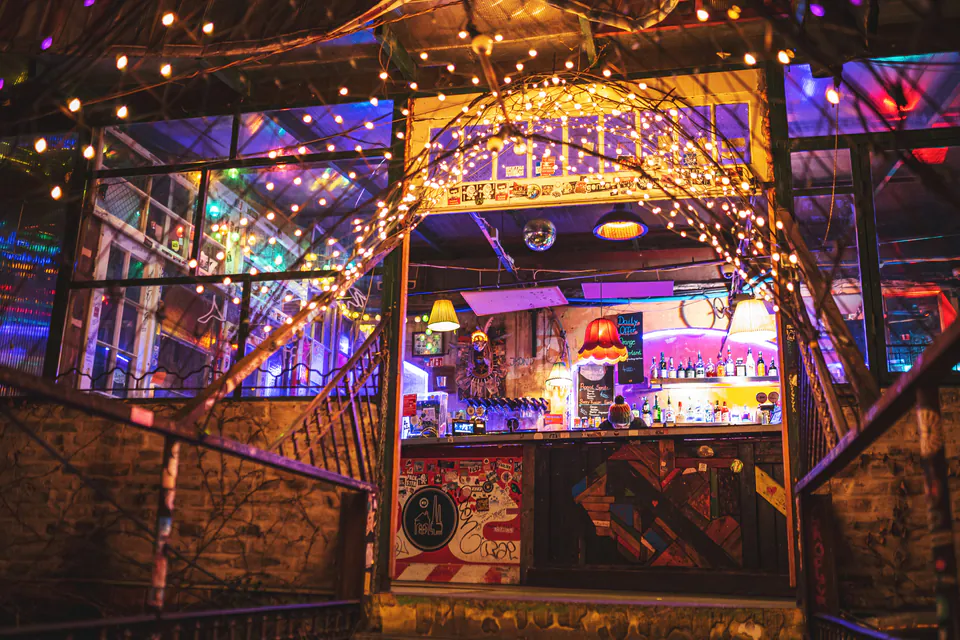
But Szimpla isn't just about drinking. On Sunday mornings, they turn the whole place into a farmers' market where local people sell fresh food and handmade stuff. During the week, there's live music, art shows, and movie screenings. It's like a community center that happens to serve alcohol.
Even though tourists know about it now, the place still feels real and unpretentious. We've been there tons of times and always find something new - a hidden corner, some weird art piece, or maybe a random performance happening. That's what makes these places special.
Instant-Fogas Complex - Party Paradise
If you want to party hard, Instant-Fogas is where you go. This place is absolutely massive - they combined two legendary bars in 2017 and now it takes up an entire apartment building. We're talking over 20 rooms, 18 bars, multiple dance floors, and two gardens. It's pretty overwhelming the first time you visit.
Each room has its own music and vibe. You can walk from a room blasting techno to one playing jazz to another with Latin music. The decorations are completely wild - there are crazy animal paintings on the walls and actual airplane parts hanging from the ceiling. We once spent three hours there and still didn't see everything.
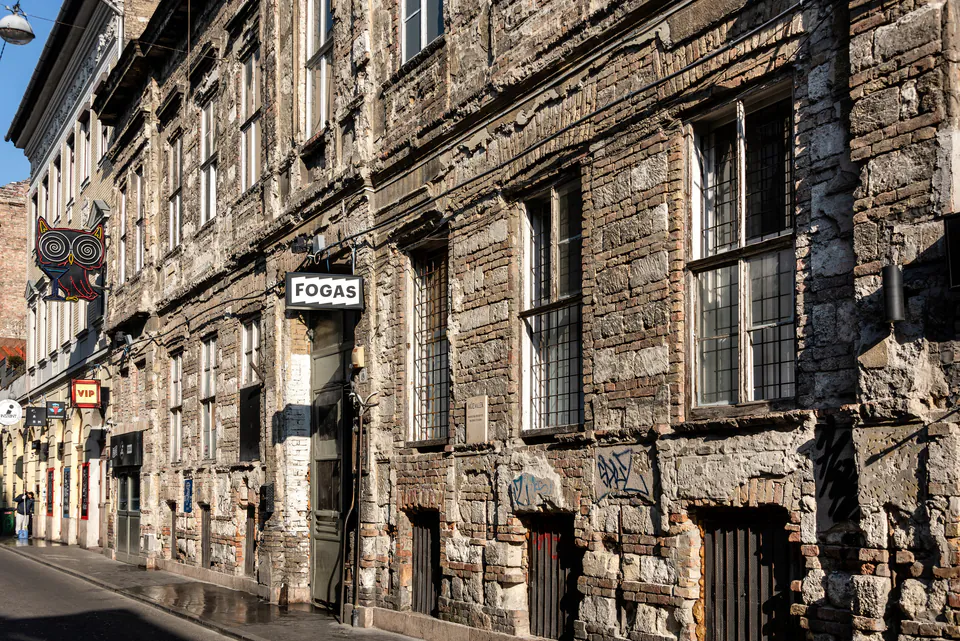
The best part? No cover charge and they're open from 6 PM to 6 AM every day. Just be ready for crowds, especially on weekends. And bring your energy because this place will wear you out in the best way possible.
Other Cool Places Worth Checking Out
While everyone talks about Szimpla and Instant-Fogas, there are tons of other great ruin pubs around. Mazel Tov is fancier than the others - they serve Middle Eastern food and have this gorgeous garden courtyard with a glass roof. When we went there for dinner, it felt almost magical with all the lights.
If you want something quieter, try Csendes Létterem (which means "quiet" in Hungarian). During the day it's more like a café, and at night it's perfect for actually having conversations without shouting over music. We've seen lots of people working on laptops there during the day.
Doboz is only open Friday and Saturday nights, but it's worth it for the giant wooden King Kong statue alone. This thing is climbing an actual tree in the courtyard and it's completely ridiculous. They play a lot of reggaeton music and the crowd gets pretty wild on weekend nights.
For beer lovers, Élesztőház focuses on craft beer from Hungary and other countries. The space feels more industrial than the others, and they really know their stuff when it comes to beer.
What You Need to Know Before You Go
Popular Ruin Pubs Overview
| Venue | Atmosphere | Key Features | Best For |
|---|---|---|---|
| Szimpla Kert | Laid-back, eclectic | Original venue, farmers market, live music | First-time visitors, cultural events |
| Instant-Fogas | High-energy, party | Multiple rooms, diverse music, open late | Dancing, late-night partying |
| Mazel Tov | Upscale, refined | Middle Eastern cuisine, beautiful garden | Dinner and drinks, romantic evenings |
| Csendes Létterem | Quiet, intimate | Vintage décor, café by day | Conversation, relaxed drinks |
| Doboz | Weekend party | King Kong sculpture, reggaeton music | Weekend nights, unique photos |
All these places are really close to each other in the Jewish Quarter, so you can easily walk between them. Getting there is easy - just take the tram or metro to the area.
Most places don't charge to get in, though some might during special events or busy weekend nights. Drinks are pretty cheap compared to other European cities. Local beer usually costs 400-800 HUF and cocktails are around 1000-2000 HUF.
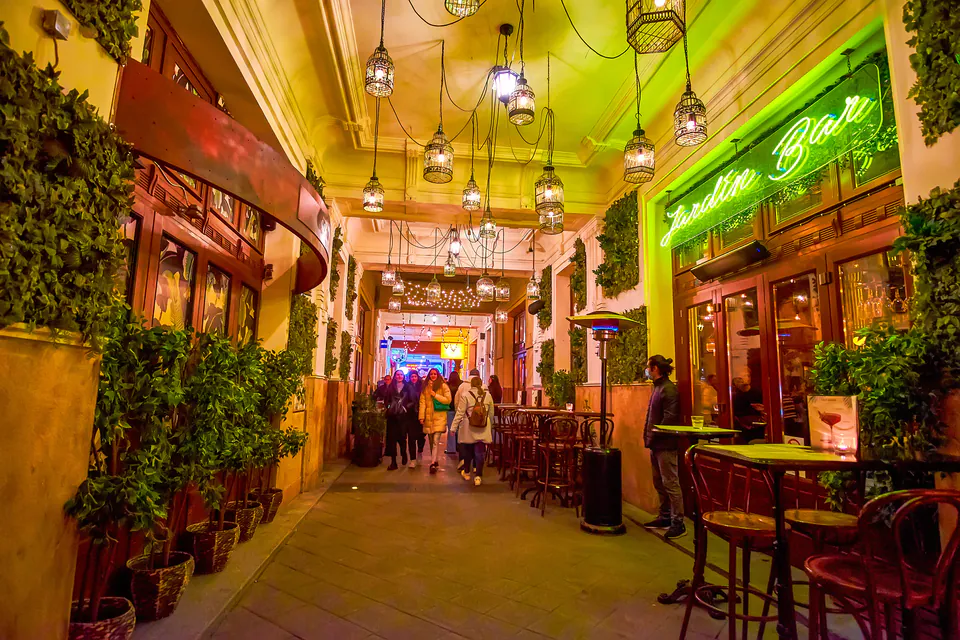
Best Times to Visit
These places are open all year round. In winter they heat the indoor areas, and in summer the outdoor courtyards are amazing. Most open around 3-6 PM and stay open until 2-4 AM. Instant-Fogas goes until 6 AM, which is pretty crazy.
We always recommend going on weekdays if you want a more chill experience. You can actually find seats and have conversations. Weekends get packed and loud, especially after 10 PM. If you show up earlier in the evening, you can really appreciate all the weird decorations before it gets too crowded.
Don't worry about dressing up - these places are super casual. Just wear comfortable shoes because you'll be walking on uneven floors and climbing stairs. Most places take credit cards now, but having some cash in Hungarian Forints is always useful.
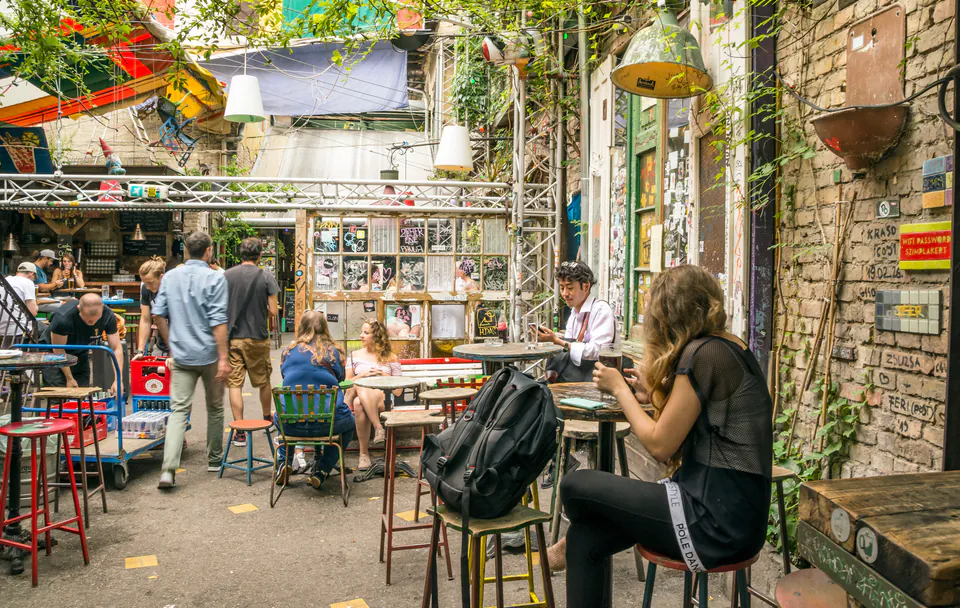
Why These Places Matter
Ruin pubs have become way more than just bars. They host art shows, concerts, movie nights, and all kinds of community events. People from Budapest actually hang out there, not just tourists.
The Sunday market at Szimpla Kert is a perfect example. Local farmers and artists sell their stuff there, and it keeps the place connected to the community. It shows how these bars are really about bringing people together, not just making money.
These places also saved a whole neighborhood. Instead of tearing down old buildings, people found creative ways to use them. The Jewish Quarter went from being pretty run-down to one of the most popular areas in Budapest. That's pretty amazing when you think about it.
How to Make the Most of Your Visit
Start early in the evening when it's not too crowded yet. That's when you can really look around and see all the crazy details without people bumping into you. Each place has tons of hidden stuff - weird art, funny signs, random objects turned into decorations.
Don't just stay in one room, especially at the bigger places. Part of the fun is exploring and finding surprising spaces. We always tell people to think of it like a treasure hunt.
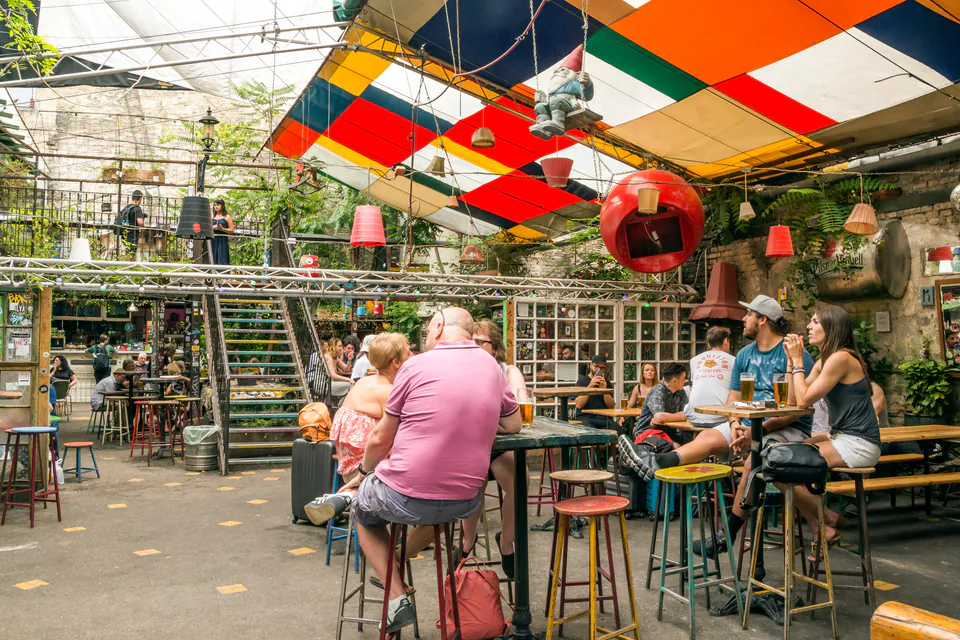
If it's your first time, maybe join a guided tour. You'll learn the history and hit all the important spots without getting lost. But going on your own is fun too because you can spend as much time as you want in each place.
One thing - try to be quiet when you leave, especially late at night. These places are in residential areas and the neighbors have to put up with a lot. Most bars have signs asking people to be respectful, and it helps keep everyone happy.